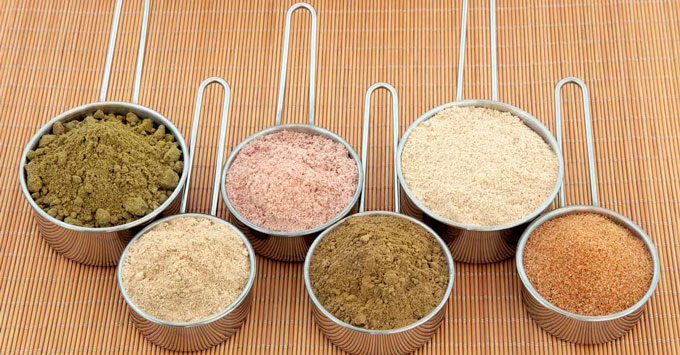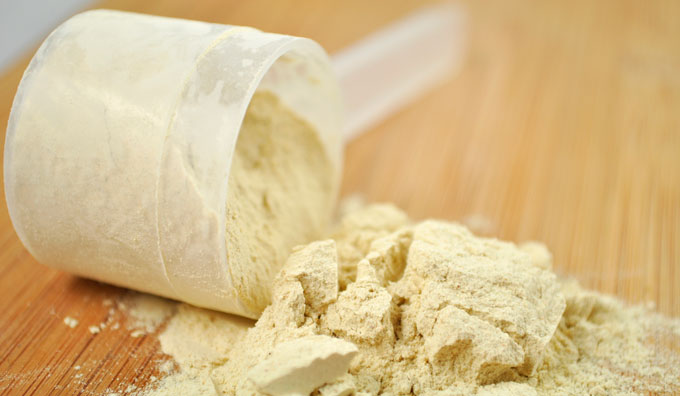How much does protein powder cost (average price per 1 kg.)?
Moscow and Moscow region
We believe that many adherents of a healthy lifestyle, as well as sports enthusiasts, are aware of such a food product as food protein or protein powder. At its core, protein powder is a dry mix that contains a large amount of protein. In addition, special vitamin complexes are often added to the composition of the protein powder, which have a beneficial effect on the entire human body as a whole.
Composition of protein powder
However, the main purpose of protein powder is still considered to help athletes maintain a certain level of physical development. Although in modern medicine and dietetics, food protein has long been considered a product not only of a sports, but also of a therapeutic and preventive nutrition menu. It is worth noting that specially selected mineral compounds are included in the composition of the protein powder, which help the human body to easily absorb the enormous amount of proteins that the mixtures contain.
Producers talk about the benefits of protein powder sports nutrition as well as physicians and professional nutritionists. It is believed that protein powder contributes to the normalization of digestive and metabolic processes. Besides, regular use dietary protein helps improve performance immune system person. Compounds that, as a rule, are part of the protein powder are involved in the renewal of body cells.
In addition, the biologically active substances that make up the protein powder act as natural antioxidants, which contribute to the removal of harmful elements that enter the human body from the environment, as well as food products in the process of life. As a result of scientific research, it was found that protein powder strengthens human bones, and also contributes to normal functioning. nervous system and even has a calming effect.
The dangers of protein powder
However, as they say, every coin has two sides. Therefore, there may be harm from protein powder for human body. True, in fairness it should be emphasized that the harm of protein powder occurs only if the product is consumed in unlimited quantities. In addition, before you start eating any biologically active food supplements, including food protein, you should undergo a thorough medical examination, and also consult a doctor.
With an overdose of protein powder, the human liver, as well as the kidneys, simply cannot cope with the processed products of such a large amount of protein that is regularly ingested. In order for the protein powder not to harm the body, you need not only to consult a doctor, but also choose for yourself suitable look product. Since each type of protein powder is aimed at a specific result.
Protein is a key participant in important physiological processes, without which the functioning of organs and systems cannot be carried out. Protein nutritional supplements are more popular among athletes, as they help to improve performance and quickly gain muscle mass.
What are proteins
These substances serve as the most important building blocks of the human body. Proteins are found in every organ and cell, in addition, they serve as irreplaceable sources of energy. If the body does not receive enough protein, the liver converts proteins into fats, thereby forming a reserve of a quickly available source of energy. The assimilation of a substance begins immediately after it enters the stomach with food and lasts a long time when compared with the process of digesting carbohydrates. Therefore, when consuming protein foods, a person feels full for several hours.
What are proteins made of? The composition of this substance includes amino acids that are transported by blood to every cell of tissues and organs. Protein play important role in the life and growth of the body, they are able to normalize the water and acid-base balance. Without amino acids, it is impossible to create enzymes, hormones, and this is only a small part of the functions of these substances. Chemical formula protein molecule has the following form: H2N–CH(R)–COOH.
What is protein for?
Protein, polypeptides and protein - the name of one element, which consists of a chain of amino acids. The component serves as the basis of tissues and the main building substance of the body. What is protein and what is it for? Regular intake of protein into the human body guarantees nitrogen balance and increases the rate of growth muscle mass. Proteins are substances that contain a large number of amino acids. They may be plant or animal in nature.
Why drink protein? With regular consumption of a product containing a lot of proteins, athletes increase muscle volume and maintain the energy charge necessary for a full workout. Wherein, right amount protein for a person involved in bodybuilding depends on the degree of intensity of sports. Daily you can consume up to 2-3 grams of protein per 1 kg of body weight. In order for amino acids to be absorbed normally, carbohydrates must also be present in the diet.
What does protein help bodybuilders achieve? If you regularly use the substance in parallel with sports activities:
- an increase in muscle mass will begin;
- fat deposits will burn quickly (this is due to the fact that the protein suppresses hunger well, in addition, the rate of fat breakdown depends on the volume of muscles: the more there are, the easier it is for a person to lose weight);
- health will improve (proteins ensure the renewal of every cell in the body);
- the athlete's body will become more prominent (this is due to the growth of muscle mass and help in losing weight).
Protein shakes for muscle growth
This product belongs to the group of sports nutrition products and is a rich source of protein, while the protein powder does not increase the daily calorie content of the diet. A protein shake is useful for everyone who is seriously involved in sports, trying to improve their body faster. At the same time, the choice of a product should be based on the intensity of training, their frequency and individual parameters of a person (weight, height, etc.).
You can drink cocktails before or after playing sports for half an hour. It is desirable that the temperature of the drink be about 37 degrees - this will improve the absorption of nutrients. Reception protein shake at night can only be beneficial if you drink a certain type of product that takes a long time to digest. To achieve the expected effect, the powder must be diluted in 250-300 ml of liquid, then the protein will be fully absorbed by the body.
Protein for weight gain
To increase body weight, it is important to eat a lot of protein foods, but not everyone is able to eat the right amount of food to make up for the lack of protein in the body (especially athletes). Especially for this purpose, protein supplements containing a high proportion of protein have been created. You can buy protein powder at any sports nutrition store. However, it should be understood that proteins for weight gain are only an addition to the usual diet, and not at all a replacement for protein foods (cottage cheese, other dairy products, meat, beans, etc.).
It is most effective to use amino acids in combination with sports, good rest and balanced nutrition. A person who decides to drink a protein shake to gain weight, but who does not go in for sports, should provide himself with at least minimal physical activity (jogging a couple of times a week, daily exercises, developing a specific muscle group). Otherwise, the resulting protein will be excessive, so it will not be absorbed by the body, and fats and carbohydrates in the composition of the product will settle as an extra load on the body in the form of deposits.
Why do girls need protein
Women involved in fitness often use sports nutrition, including protein shakes. Protein for girls is amino acids that are responsible not only for muscle development, but also help:
- improve the functioning of the gastrointestinal tract;
- restore hormonal levels;
- deliver trace elements and nutrients to body tissues;
- improve the protective functions of a person.
There is no difference in the effect of amino acids on the female and male bodies: for a person who regularly intensively engages in bodybuilding, the daily intake of the substance should be approximately 1-2 grams per kilogram of body weight. Proteins that enter the body in the form of supplements perform the same functions in men and women, so the protein powder is not divided into female and male (with rare exceptions, in which sports nutrition may contain sex hormones, but this must be indicated on the packaging).
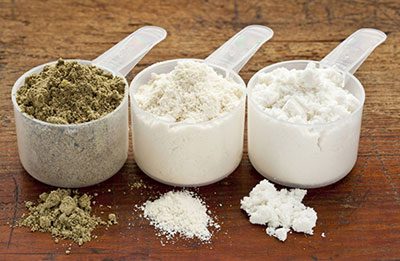
Protein for weight loss
In addition to weight gain, a nutritional supplement can perform the exact opposite function and be used for weight loss. This can be achieved by choosing the right diet, type and intensity of sports training. Consequences of regular practice and low-calorie food will get rid of excess deposits in the body. However, since the body begins to burn not only fat but also muscle in a calorie deficit, it is important to consume enough protein during weight loss to prevent loss of muscle tissue.
Girls and men need protein for weight loss not only to maintain existing muscles, but also to build new muscle tissue. Amino acids help the body to lose weight properly, using only those accumulations that have a fatty structure. At the same time, it is important to actively engage in sports, otherwise the consumed proteins will be deposited in the body with new folds. When consuming protein for weight loss, you need to follow this rule: there should be a minimum of harmful carbohydrates in the menu, and you need to consume calories by 15% less than you spend per day.
Types of proteins in sports nutrition
There are a lot of varieties of the product and additives are divided according to the type of raw material and the degree of purification. The second factor plays a much smaller role than the first one. The types of protein and the purpose of the product are closely related, since each type of supplement differs in efficiency and action. To choose the right protein for a particular task, it is worth analyzing the characteristics of each type of protein.
Whey Protein
The name of the product indicates that it is made from whey. Distinctive feature This supplement is fast digestible (the process takes a minimum of time compared to other types of protein), so it is better to use soluble whey protein immediately before or after training. The product contains meat protein and is therefore not suitable for vegetarians. According to the degree of purification, it is divided into:
- whey protein hydrolyzate;
- isolate whey protein;
- whey protein concentrate.
Casein protein
This type of nutritional supplement has a higher price than others, but has a more useful (rich) composition of amino acids. However, casein protein is absorbed by the body longer, so you should drink a cocktail in advance before training or even at night. In adults, casein protein can cause allergies, so protein should be used with caution. The product is prepared by curdling milk, at home it can be replaced with natural sour curd(he is less fat). According to the degree of purification, the product is divided into:
- calcium caseinate;
- micellar casein.
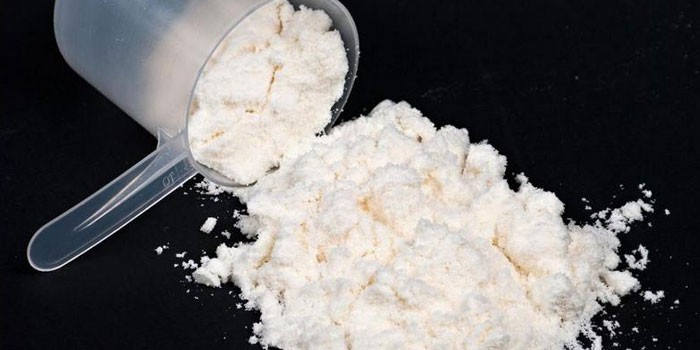
soy protein
The substance is obtained from soy, so the product has a relatively low cost. However, plant proteins, including soy protein, do not have a complete amino acid profile and are not able to stimulate protein synthesis in the same way as other types of product do. If you increase the dosage of the additive and supplement the product with lecithin, the effect will be much better. The advantage of soy and hemp proteins is that they swell a lot when mixed, which is very appropriate during weight loss (the drink gives a feeling of satiety).
Which protein is best
According to many athletes, whey protein is the best: the product is well absorbed by the body, saturating the body useful substances to quickly restore an energy source such as ATP. In addition, the supplement stimulates anabolism, thereby accelerating muscle growth. However, the main disadvantage of whey protein is its relatively high cost.
Say that best protein- the one that is obtained from whey is impossible, since for each athlete one or another type of sports nutrition may be more useful, depending on the goals, systematicity and intensity of the athlete's training. Consider the pros and cons of each type of protein:
- casein protein. The advantages of the supplement include the presence in the composition of the protein of all essential amino acids and its constancy, with which the body assimilates the product for a long time. So, taking a portion of protein at night, you can not worry about the destruction of muscle tissue - casein will provide the muscles with the necessary components for their recovery. The downside of the supplement is poor digestibility: once in the stomach, the protein curdles, turning into a solid lump and slowing down the digestion process not only of its own, but of all other types of protein. It is worth using casein for those who want to lose weight, as it gives a long-lasting feeling of satiety.
- Whey Protein. The product is divided into three types according to the degree of purification, among which whey protein isolate stands out favorably. Its advantages lie in good taste, excellent quality and good digestibility. The supplement contains neither lactose nor fat, while the protein has all the necessary amino acids for the development and increase in muscle volume. The disadvantage of the supplement is the relatively high cost and high probability of purchasing a low-quality product, since some manufacturers mix other types of protein into it.
- Soy protein. It is considered the least effective protein for athletes because it contains an incomplete set of amino acids. In addition, soy protein tends to transform into estrogen, which is undesirable for male athletes. The advantage of the supplement is its benefits for the body: protein strengthens the immune system, normalizes cholesterol levels and reduces the risk of developing cancer.
- egg protein. The advantages of the product are excellent digestibility and a rich, perfectly balanced amino acid composition. The disadvantages of the additive include the high price and bad taste.
- Fish protein. The disadvantage of the supplement is that the amino acids needed by the athlete's body in its composition are poorly absorbed, so the product is practically useless for a bodybuilder.
- Rice, pea protein, etc. Cereal proteins are not very effective for athletes who want to gain muscle mass, because they have a low biological value. In addition, plant amino acids are slowly broken down and absorbed. Some supplements contain inhibitors that slow down digestion. The advantage of the product is its low price.
- Meat protein. The supplement contains virtually no cholesterol and fat and is made from beef protein. The advantage of the product is the presence of creatine in its composition, which additionally stimulates muscle growth and strength. In addition, meat protein is highly digestible and has a rich amino acid profile. The disadvantages of this type of sports nutrition include high cost.
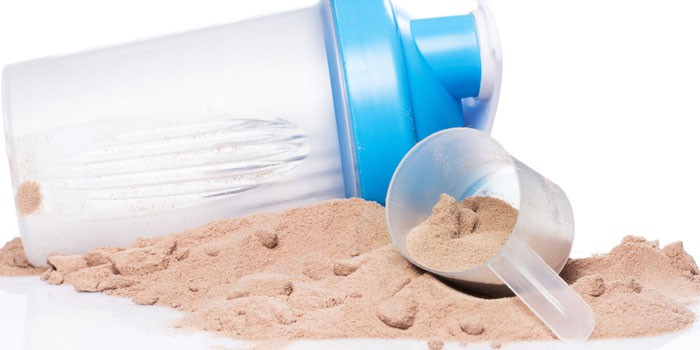
How to take protein
For muscle growth, it is optimal for a person to consume 1.5-2 grams of protein per kilogram of body weight. It is better to drink protein twice a day, since it is difficult for the body to absorb a large amount of protein at one time. In this case, it is better to use a cocktail in the intervals between meals: on training days - between breakfast and lunch, and after immediately after class. On ordinary days, you can drink the primary intake of a protein drink instead of afternoon snack and the second time before dinner.
How to make a protein shake
To make a smoothie, you can simply mix the powder with water, juice, or milk. Optionally, you can make a multi-component drink using recipes from the network. The main thing is that protein shakes should not be hot, otherwise part useful properties will be lost. Regardless of whether you are trying to lose weight or gain muscle mass, making cocktails is no different. However, in the first case, you need to replace 1-2 meals a day with a protein drink, in the latter case, supplement your usual diet with amino acids. Cooking method:
- measure the right amount of protein with a measuring spoon;
- add some vanilla;
- mix the powder with lemonade or milk (200 ml);
- shake the mixture in a shaker.
The benefits and harms of protein
Protein is an indispensable assistant in the process of building muscle tissue, which needs additional building material during intense exercise. Like any product, the supplement has advantages and disadvantages. Benefits of protein besides helping to increase muscle volume:
- suppresses the feeling of hunger, helping to reduce the daily calorie content of the diet and thereby contributing to weight loss;
- lowers blood sugar levels;
- can serve as a hearty and healthy snack at work or on a trip;
- with its help, you can make up for the lack of proteins in the diet, which is especially important for vegetarians;
- includes a complex of amino acids necessary for the body;
- quickly absorbed, without leaving a feeling of heaviness;
- helps to increase energy charge, strength, endurance;
- normalizes insulin levels.
In addition to the positive aspects, the protein supplement has several disadvantages. What can be the harm of protein:
- powder can cause eating disorders (this applies to people who are lactose intolerant);
- when using an excessive dose of the supplement, the kidneys or liver may suffer;
- chemical sweeteners, flavors and other substances added by manufacturers to the product negatively affect the body.
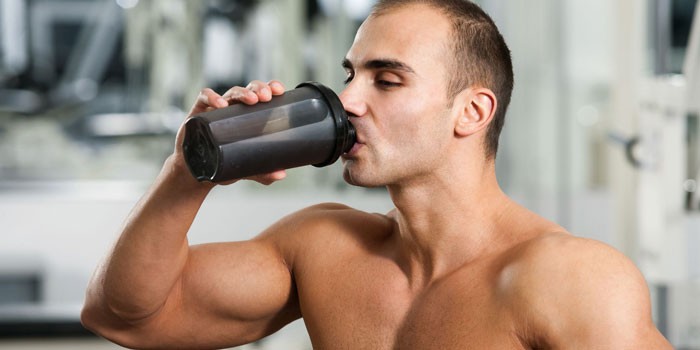
side effects of protein
Read the label carefully before buying a sports supplement: the manufacturer, as a rule, indicates the side effects of the protein. Problems from drinking casein/whey powder can occur in people who have bowel problems or lactose intolerance. In addition, with the abuse of amino acids, the kidneys are subjected to excessive stress. To avoid the development of pathological conditions, it is necessary to control the amount of protein entering the body. Obesity can be another negative effect of excessive protein intake.
Protein Contraindications
Knowing what protein is and that lack of protein leads to various functional disorders internal organs and human systems, it should be understood, however, that some protein is contraindicated. People with:
- kidney disease, renal failure;
- genetic predisposition to diseases of the kidneys, liver;
- allergy to protein components;
- lactose intolerance (when using whey / casein protein).
Video: All about protein
This article is a concise and concise guide to protein powders, which does not contain unnecessary facts and empty words! After reading it, you will become a real expert and surprise your friends by always answering questions with confidence, which protein is best for gaining muscle mass.
What do you really need to know about protein powders? As a beginner in bodybuilding, of course you want to know the answers to the most important questions. At the end of the article you will find information on which protein is better to choose from domestic and foreign manufacturers.
Are protein powders necessary? Do they really work? How much should be taken? Which to choose? Which one is the best? And finally, how soon will you start attracting the attention of the opposite sex?
This article is not intended for those who want to learn about the features of ion exchange, genetic mutations, isotopically labeled protein indicators ... and all that. This article explains the basics of using protein powders in an accessible way without the hype and confusion that usually accompanies the description of any sports nutrition. By the time you finish this article, you will be a real expert on this subject and surprise your friends on your next trip to the sports nutrition store. No more hours of wandering around the shops!
Is Protein Powder Really Needed to Gain Muscle Mass?
The use of protein supplements is not an absolute requirement for mass gain. It is hardly possible to meet a person who can consume 400 grams of protein per day from a regular diet. If you need to get more than 200 grams of protein per day, use a protein powder - it will make your life much easier.
In addition, protein powders and meal replacement drinks are generally more cost effective than regular products. Don't get me wrong, protein powders are still just a dietary supplement. Once again, we emphasize: the focus of any diet should be food. Natural products are preferred because they contain a full range of nutrients that powders do not.
The bulk of dietary protein should come from meat, fish, poultry, and eggs. However, getting all your protein from food isn't always practical or convenient, especially if you have to eat 6 or more times a day to get enough. Note that for optimal results, you should limit your intake of protein shakes to a maximum of three times a day, or 40% of your daily food intake.
Remember that food and nutritional supplements should provide optimal nutrient intake, including required amount squirrel. Most of those reading this article do not have a personal chef at home who would select diet food for you. And don't make the fatal mistake of thinking that protein powders can replace hard training and proper nutrition.
"Remember that food and nutritional supplements should provide optimal nutrient intake, including the required amount of protein."
Do Protein Powders Really Work? Are they harmful to health?
The most frequently asked question is: "Does protein powder actually help me build muscle or is it a scam?" A better question is: "Does the protein really work?". The obvious answer is yes.
Protein is made up of individual "blocks" called amino acids, which perform a variety of functions in the body. For example, they are responsible for the synthesis of muscle fibers and maintaining muscle health while maintaining a diet and constant physical activity.
Protein Functions:
- Participates in the production of red blood cells.
- Supports the immune system.
- Maintains healthy hair, nails and skin.
However, not all protein powders are the same, and it's important to note that not all protein powders are as safe as they say on their packaging. Unfortunately, most protein powders are full of harmful ingredients such as artificial colors, fructose, saccharin, and aspartame. Buy protein powders from natural ingredients, and not those that contain chemical sweeteners and other substances that do not promote muscle growth and fat burning.
You are damaging your health when you consume low-quality smoothies with refined and processed carbohydrates (for example, with syrup from brown rice, sucrose or fructose). Before buying, make sure that the manufacturing company is committed to protecting your health. Unfortunately, the production of lower quality, but cheaper products will continue, because there is a demand for them among bodybuilders. So look for impartial reviews, research the history of the company and its reputation. And only then make a decision!
Another criterion for quality protein product can be called ease of preparation. Most protein powders are easy to make into a smoothie, even with the help of a regular spoon. But the testament to true quality is the lack of taste—a necessary sacrifice to keep the powder safe and healthy. Once all artificial chemical sweeteners (aspartame, sucralose) are removed from the product and simple sugars, it loses its taste and can even be bitter.
How to take protein for gaining muscle mass?
How Much Protein Powder Should You Consume?
A better question is, "How much pure protein do I need to achieve this or that?"
Protein is an extremely important macronutrient that needs to be consumed a lot and often throughout the day. The average amount of protein needed is 2 to 3 grams of protein per 500 grams of muscle mass. This means that if you weigh 75 kg and are 10% body fat (75 x 0.10 = 7.5 kg fat, net muscle mass is about 67.5 kg), then you need 135 to 200 grams of protein per day.
Protein powder can be used primarily for making shakes that you drink before, during or after your workout. Liquid food product at this time, it is preferable to use, because it has a higher absorption rate. Do not substitute protein powder for more than two meals a day. Here's what your typical day might look like:
- First meal (breakfast) – regular food
- Second meal (mid-morning) - liquid protein food
- Third meal (lunch) - regular food
- Fourth Meal (Midday) – Regular Meal
- Meal 5 (Pre and Post Workout) – Liquid Protein Meal
- Meal 6 (Dinner) – Regular Meal
- Seventh meal (before bedtime) - regular food
Which protein to choose for gaining muscle mass?
Before you make your final decision, check out short descriptions to help you sort through the different protein powders.
Whey Protein
Whey protein makes up 20% of milk protein. Whey is an excellent, fast-absorbing protein source with an excellent amino acid profile, high content cysteine and a mixture of peptides. Since it is absorbed very quickly, the best time for its use - before / during training or immediately after it. It is great for when you need a lot of energy and when your body is in an anabolic state.
Casein
Casein makes up 80% of milk protein. Casein also has an excellent amino acid profile and an excellent blend of peptides, but is slow to digest. Since casein is slowly released into the bloodstream, it should not be used during or after training - at this time you need a "fast" protein. Casein can be used in all other cases.
soy protein
"It's best to avoid soy protein and consume other types of protein listed in the article.Soy protein is the most controversial of all protein types. Soy food aficionados believe that soy products have an almost magical effect on the human body. But there is also a large amount of research that shows that soy protein can be harmful in many situations. Because of this confusion, it's best to avoid soy protein altogether and use other proteins instead.
Protein blends
Protein blends are usually a combination of several types of protein, such as a blend of whey protein concentrate, whey protein isolate, egg white, casein and soy protein. Why is the mixture better? You get a full spectrum of proteins that have varying degrees of absorption. The blend creates an anabolic environment thanks to whey protein and provides an anti-catabolic effect thanks to casein. Use them at any time of the day, but NOT before or after a workout.
Whey hydrolysates
Whey hydrolyzate (also known as hydrolyzed whey protein or peptide blend) are the most "potent" proteins and are the fastest absorbed; it best form protein product, as your body prefers peptides over whole protein. Hydrolysates are produced at very low temperatures, under low acid conditions and mild enzymatic filtration (so they are full of essential and branched chain amino acids). They have the potential to promote short-term protein synthesis before and after exercise.
Which is better: whey protein or whey isolate?
Most whey protein powders on the shelves are made from whey protein concentrate mixed with a small amount of whey isolate. In comparison, isolate is more expensive than whey protein concentrate because it is higher quality (more pure) and has a higher biological value. Whey Protein Isolate contains more protein, less fat and less lactose per serving. High-quality isolate contains 90-98% whey protein, while concentrates contain about 70-85% protein. Whey protein isolate contains the largest number protein found in milk. Due to its chemical structure, it is most easily absorbed in the gastrointestinal tract.
Obviously, a high concentration protein isolate supplement would be the preferred choice. However, this is a personal decision because isolate is more expensive, and just because it's purer doesn't guarantee that you'll get bigger muscles. It cannot justify the extra cost.
So what's the bottom line? Which to choose?
Pre- and post-workout whey hydrolysate use is likely not enough to affect protein synthesis. As already mentioned, whey isolate is an extremely high quality whey protein. For best anabolism, isolates should only be combined with whey hydrolysates before or after exercise. A small amount of Whey concentrates in your diet won't hurt you, but they shouldn't be the number one ingredient.
If you need a powder to support muscle growth and recovery (at any time other than training), use protein blends. You will receive a full spectrum of proteins with different absorption rates. In addition, you will maintain an anabolic state with whey protein, and casein will counteract catabolism.
Which protein is better among domestic producers
When you choose the right nutrition for muscle growth, protein is very important. More precisely, its quantity and amino acid composition. When buying protein for gaining muscle mass, which one is better to say is difficult in terms of muscle growth. Any quality protein is good for this purpose. But which one is better you will know from the video below. You will find out the results of analyzes of domestic proteins: Pureprotein, Rline, RPS, Atech, KingProtein, Geneticlab, Academy T.
Which protein is better among imported manufacturers
Foreign proteins were analyzed here: MyProtein, Dymatize, Arnold, Mex, Universal, San, Ostrovit, Syntrax. All the results are presented in the video, based on the information received, you can conclude which brand of protein is better to buy.
Conclusion
We hope this article has taught you the basics of using protein powders and empowered you to make your own decisions when shopping in sports nutrition stores. Now you can ask the seller for exactly what you are looking for, and not remain indifferent to the banks on the shelves without the advice of a consultant!
Oh yes, protein powder will also help you lose weight and be successful with the opposite sex. But he won't do it in an "ultra short period of time" without appropriate diet and lifestyle adjustments.
According to materials:
http://www.bodybuilding.com/fun/vinced7.htm
Sooner or later, many people involved in strength sports think about the need to take additional food supplements. On television, in magazines, newspapers, disputes about the dangers and benefits of sports nutrition do not stop. That anabolic steroids negatively affect the human body, probably everyone already knows. Is protein harmful or not? Is it really so necessary for athletes and will its use lead to health problems in the future? Let's try to figure it out.
What is protein
The English word protein is translated into Russian as "protein". And protein is a necessary component of a healthy human diet, since it is involved in all life processes: 
- is responsible for the construction of bone and muscle tissues of the body;
- protects against bacteria and viruses;
- is a source of energy;
- regulates the metabolism in the body;
- carries oxygen in the circulatory system;
- keeps skin, nails and hair in good condition.
In sports nutrition, protein refers to a high-protein powder. It is easily absorbed by the body and contains all the essential amino acids.
Protein powder is made from natural extracts of products containing animal or vegetable protein:
- dairy products;
- meat;
- peas.
The raw material goes through several stages of cleaning and drying, resulting in a completely natural protein concentrate, which is used in sports nutrition as an additional source of energy and material for building and regenerating muscles.
How protein affects health
According to doctors, the use of protein powder good quality and in a reasonable dose does not have a negative impact on health. On the contrary, many scientific works have proven the beneficial effect of protein on the human body.
 Protein is useful for both men who want to gain muscle mass and women who want to lose weight. get rid of skin problems and have strong healthy hair and nails.
Protein is useful for both men who want to gain muscle mass and women who want to lose weight. get rid of skin problems and have strong healthy hair and nails.
All parents know what an important role protein plays for the growing body of a child, so the question may arise: is it possible for children to have protein? Experts agree that protein powder in an age dosage affects the child's body (from 3 years old) only in a positive way. Therefore, if it is difficult for a child to feed meat or cottage cheese, but he will be happy to drink a protein shake at an age dose, there will be no harm in this.
Lack of protein in the human body leads to:
- sleep disturbance;
- depression and irritability;
- decrease in immunity;
- frequent violations of the chair;
- weight gain;
- slow healing of wounds;
- dry skin;
- fragility of hair and nails;
- development of various diseases.
Irrational nutrition and diseases of the gastrointestinal tract lead to symptoms of protein deficiency in the body, and people with increased physical activity and athletes achieve consumption daily allowance protein from food is simply unrealistic. This is why consuming protein powder is a vital necessity.
It is important to understand that protein is an extract from products, and any product has properties, contraindications and daily intake. In accordance with this, the benefits of the protein or the harm that can be done to the body is determined.
Daily protein intake
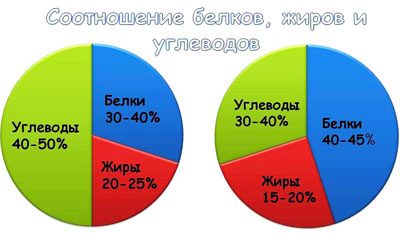 The daily requirement for protein is individual and depends on the age, gender and physical activity of a person. In accordance with the recommendations of the World Health Organization The norm of protein intake is considered to be 0.8 - 1 g / kg of body weight. This is an average figure for an adult with moderate physical activity. For children under 18 years of age and pregnant women, the protein norm is 2 g / kg per day.
The daily requirement for protein is individual and depends on the age, gender and physical activity of a person. In accordance with the recommendations of the World Health Organization The norm of protein intake is considered to be 0.8 - 1 g / kg of body weight. This is an average figure for an adult with moderate physical activity. For children under 18 years of age and pregnant women, the protein norm is 2 g / kg per day.
People engaged in heavy physical labor and athletes should take 2.5 g of pure protein, for girls and women whose task is to lose weight and maintain good physical shape - 1.5 g / kg of body weight.
Exceeding the daily intake of protein up to 3 g / kg leads to side effects: indigestion and kidney disease.
If it is almost impossible to exceed the norm of protein with ordinary food, then when using protein powder it is easy. That's why it's important to follow the exact dosage when preparing a protein shake and not exceed the recommended doses indicated on the protein powder jar.
Types of Protein Powder
 Before you buy protein in a sports nutrition store, it is very important to figure out which powder is right for you. For this need to know individual characteristics organism(intolerance, allergy, chronic diseases) and take into account the purpose of use:
Before you buy protein in a sports nutrition store, it is very important to figure out which powder is right for you. For this need to know individual characteristics organism(intolerance, allergy, chronic diseases) and take into account the purpose of use:
- a set of muscle mass;
- weight loss;
- recovery after power loads;
- maintaining general health;
- replenishment of the missing amount of protein from food (vegetarians, people with diseases of the abdominal cavity).
So that the protein powder does not harm the body, it is recommended that when choosing it, be guided by the advice of a trainer and your doctor, who will prescribe the type of protein that meets your needs in the necessary and sufficient dosage.
Powders with an animal base
Protein powder based on animal products is most popular with athletes: 
- Egg protein is an excellent source of protein, the benchmark among protein powders, containing all the essential amino acids. Has the highest amino acid digestibility ratio - 1.00. It is egg white that is chosen by bodybuilders seeking to gain muscle mass. With it, muscle fibers build up faster than with any other type of protein. Recent scientific studies have shown that the use of egg protein strengthens the heart and blood vessels, increases the level of good cholesterol. There is only one contraindication to taking egg white - an allergic reaction to chicken eggs.
- Milk protein is another type of highly digestible protein powder with a complete set of amino acids. Milk proteins promote weight loss blood pressure and recovery of muscle fibers after exhausting workouts. The main disadvantage is the lactose content, so milk protein is harmful for people who have lactose sugar intolerance, which is expressed in disruption of the gastrointestinal tract. Milk protein consists of two types of proteins: casein ("slow") and whey ("fast") proteins, which can be purchased separately.
- Casein protein is a protein found in cottage cheese. It is absorbed very slowly (up to 7 hours), due to which the muscles feed on amino acids for a long time. For a long time suppresses the feeling of hunger, so casein is useful in losing weight.
- Whey protein is preferable to milk protein when building muscle mass. It is absorbed by the body completely and in a short time (within 30-50 minutes).
- Beef meat protein is a rarity in sports nutrition stores and has a high price, therefore it is significantly inferior in popularity to egg and milk proteins, but its creatine content is considered to be its advantage, good tolerance (an option for athletes with allergies to lactose or protein chicken eggs) and fast digestibility.
Animal-based protein powders are 100% natural, contain all the essential amino acids, and are easy to digest. They are completely safe for women, men and even child's body. Only for people with individual intolerance to animal proteins and with an increase in the recommended dose, they can be harmful.
Plant Based Protein Powders
 Plant-based protein powders are vegetarian options for proteins, but they are completely complete. and good for general health. In addition to amino acids, they contain fiber and polyunsaturated fatty acids.
Plant-based protein powders are vegetarian options for proteins, but they are completely complete. and good for general health. In addition to amino acids, they contain fiber and polyunsaturated fatty acids.
There are proteins based on hemp, flaxseed, brown rice, peas. These types of protein powders are not often found on sale, most often they are included in a mixture with other proteins.
The most common type of plant-based protein powder is soy protein.. In terms of protein content, quality and digestibility, it is closest to animal protein powder (digestibility factor 0.95). It is able to quickly restore muscles after physical training and contributes to their rapid growth.
But there is an opinion that soy protein is dangerous for men, because it contains phytoestrogens, similar in action to female sex hormones. Is protein bad for men's health? Let's consider further.
The effect of soy protein on the body
Some side effects can indeed occur with long-term use of soy protein by men. Most often this is an allergic reaction to soy, less often - digestive disorders due to gluten intolerance.
Numerous studies have shown that phytoestrogens man's health do not have a harmful effect and do not reduce potency, if you do not exceed the recommended dose. With excessive use, it is possible to reduce the production of the hormone lipase, which is responsible for the breakdown of fat, which will lead to a set of fat mass, and not muscle mass.
For women (especially during menopause), soy protein is most preferable, since its use normalizes hormonal levels and prevents the development of breast cancer.
When choosing a soy protein product, you need to pay attention to the manufacturer and price, since you can purchase low-quality protein from genetically modified soybeans, which will do more harm to health than good.
Negative effects of using protein mixtures
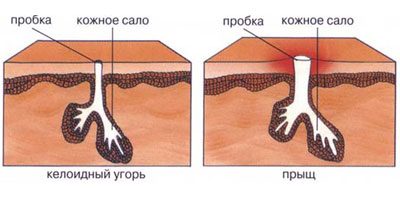 It has been proven that protein powder has a positive effect on the body. The harmfulness of protein to human health occurs only when:
It has been proven that protein powder has a positive effect on the body. The harmfulness of protein to human health occurs only when:
- individual protein intolerance;
- ill-chosen sports diet (replacement of main meals with protein shakes);
- dosage failure.
The following symptoms indicate a clear protein intolerance:
- protein rash, itchy skin;
- redness of the sclera of the eyes, lacrimation;
- discomfort in the gastrointestinal tract;
- intoxication of the body (nausea, vomiting, fever).
What else can be harmful protein? In sports nutrition stores, it is quite rare to find good quality pure protein powders. Basically, protein mixtures enriched with various additives to improve nutritional value and improving the taste of the protein.
Side effects during their use largely depend on the content of these additional substances in the composition. When buying a protein mixture, it is important to carefully study the qualitative and quantitative composition.
What ingredients in protein mixtures should alert?
- Taurine is an amino acid found in all energetic drinks. In small doses, it has a positive effect on health, but an excess of taurine makes the body work for wear and tear, increases the risk of diseases of the nervous and cardiovascular systems.
- Synthetic sweeteners (Sweeteners). Not absorbed by the body and cause irreparable harm to health in certain diseases: with renal failure (cyclamate), phenylketonuria (aspartame), diseases of the heart and blood vessels (aspartic acid). The use of sugar substitutes in large doses has an extremely negative impact on the health status, especially of children and adolescents.
- Thickeners (Gum Blend): xanthan gum, carrageenan. They give the optimal consistency when preparing a protein shake, but the regular use of these additives, according to the latest scientific data, can lead to stomach ulcers and the occurrence of oncological diseases of the digestive tract.
- Synthetic sugars: dextrose (Dextrose) and maltodextrin (Maltodextrin) are important components of sports nutrition that affect the speed of recovery after physical exertion, but excessive consumption of sugars increases the likelihood of developing diabetes, obesity, and heart disease. Often high doses of dextrose cause indigestion.
By adding various components to the composition of protein mixtures, manufacturers are not always guided only by the benefits they bring to the body and the improvement in taste. More often this is done in order to reduce the cost of the product, because a protein concentrate (60 - 85% protein) or hydrolyzed isolate (consists of 90% protein) will cost much more than a cocktail mix with nutritional supplements.
Protein Bars
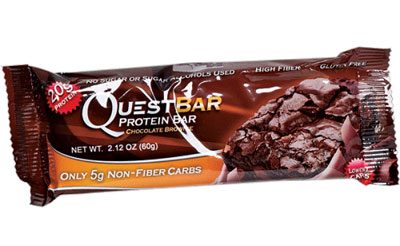 Another source of protein, in addition to high-protein mixtures, are protein bars. Their protein content should be higher than fat and carbohydrates. Unfortunately, many manufacturers under the guise of protein bars produce products containing a variety of ingredients.
Another source of protein, in addition to high-protein mixtures, are protein bars. Their protein content should be higher than fat and carbohydrates. Unfortunately, many manufacturers under the guise of protein bars produce products containing a variety of ingredients.
Therefore, if the purpose of eating a bar is to additionally obtain a high dose of protein, then you should carefully read the label about the composition and calorie content of the product. A high-quality protein bar, like protein powder, will only bring benefits, and a cheap fake will harm your health and overweight.
What you need to pay attention to when buying and using protein
It has been proven that the intake of high-quality protein in the appropriate dosage does not harm human health. But you should pay attention to the following points: 
- The use of high-protein foods should only be prescribed by a doctor or sports trainer..
- You need to purchase protein powder or mixture only from well-known and trusted manufacturers.
- You can not replace the main meals with proteins and get part of the protein from meat and fish products, legumes and cereals, nuts.
- With the constant intake of high-protein mixtures throughout the year, an imbalance of hormones and an electrolyte imbalance can occur in the body.
- With the continuous use of protein mixtures for 5 years, irreversible dystrophic processes begin in the liver tissues, develop various diseases internal organs.
That is why it is necessary to take protein courses under the strict supervision of a doctor. Uncontrolled long-term use is fraught with serious complications and health problems.
Protein is a useful, completely natural biological food supplement, correct use which in sports and diet food does not harm the body, but helps to achieve goals and improve health. Side effects occur only when using low-quality protein mixtures, in a high dose or with individual intolerance.
Most athletes sooner or later face the question of taking sports supplements. Today we will talk about the benefits and harms of protein, which is the most popular product among fitness enthusiasts.
Protein is a high protein powder (typically 60-90%) and low content fat and carbohydrate. Most importantly, it is an easily digestible protein, which is why it is so popular with people involved in sports. Protein is the perfect helper for your muscles, because they need food and building material during stress.
But like any product, protein powder has its pros and cons. Let's take a closer look at the arguments the benefits and harms of protein.
Top 15 Benefits of Protein
It is unlikely that the protein would have gained such popularity if it were not for a number of convincing arguments about its benefits:
1. Protein contributes growth of muscle mass, which means achieving maximum sports results.
2. This is an exceptional product because it contains protein without large amounts of carbohydrates and fats.
3. Promotes appetite suppression by lowering blood sugar levels and increasing levels of free amino acids.
4. Is great option snack at work or at home.
5. You can dial easily daily allowance protein, which is especially important for vegetarians and not special lovers of meat and fish.
6. Protein powder easy to use. It is enough to dilute it with milk or water, and the protein meal is ready.
7. Quickly and easily absorbed by almost 100%, does not create heaviness in the stomach.
8. Gives the body a complete amino acid complex.
9. Normalizes the level of insulin, and as in healthy people, as well as in patients diabetes second type.
10. Helps athletes increase their endurance, strength and energy.
11. You will finally close the question for yourself,. Easily digestible protein will be an excellent solution after sports.
12. Powder convenient to store and you can always take it with you. Unlike milk and cottage cheese, it is not a quickly perishable product.
13. Proteins are most often sold with additives, so you can choose the most preferred flavor for yourself: chocolate, strawberry, vanilla, etc.
14. The protein found in sports supplements is naturally occurring and completely physiological in relation to the human body.
15. Protein is safe for health, if you do not exceed the dosage and exercise.
Top 5 cons of protein
But the disadvantages of protein, like any other product, also have:
1. Protein can cause eating disorders. Especially at risk are people suffering from lactose intolerance. But this can be avoided if you buy supplements without the content of this component. For example, whey protein isolate or hydrolyzate.
2. Exceeding the dosage of protein can adversely affect performance. liver and kidneys. If you suffer from diseases of these organs, then it is better to limit the intake of sports nutrition.
3. Protein powder is practically "empty" a product that does not contain vitamins and minerals. True, there are exceptions when manufacturers specifically enrich it with useful substances.
4. Due high cost Not everyone involved can afford the regular purchase of sports supplements.
5. Protein in pure form not the most palatable product. To improve the taste, manufacturers add to it sweeteners, flavor substitutes and dyes.
As in any other, even the most natural products, you need to know the measure. We offer you several simple tips how not to wrap a very worthwhile protein product to the detriment of your health.
2. Do not replace protein powder with a full lunch and dinner. This is just a protein food supplement.
3. It is better to use sports supplements only during the period when you are actively do sports. Otherwise, the protein simply will not be digested.
4. If you have kidney or liver problems, check with your doctor before taking protein.


